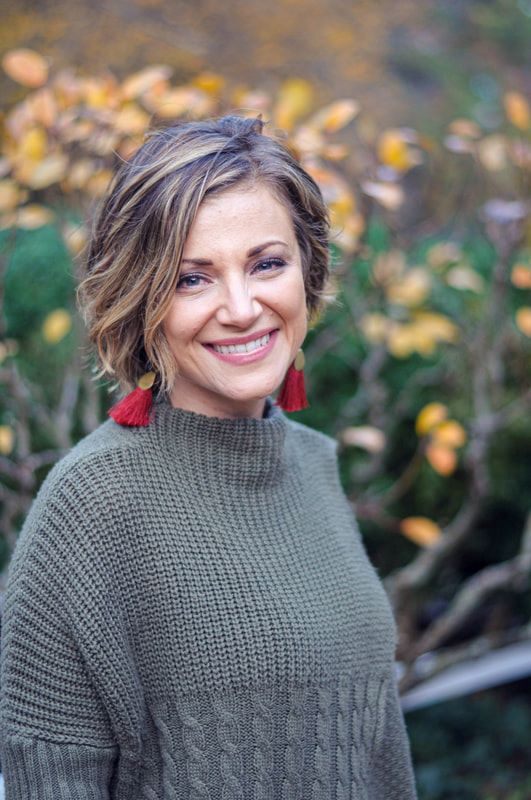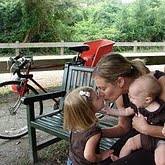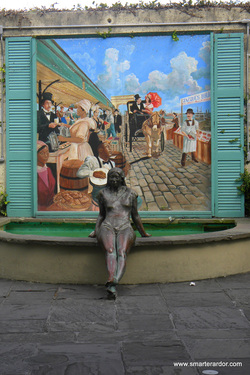 "Michelle," by Paul Perret, French Market, New Orleans
"Michelle," by Paul Perret, French Market, New Orleans I am 33. I recently discovered my first grey hair—not highlighted, not blonde, unable to be plausibly denied— it was wiry and blatantly grey. It is no longer with us. So, before you get distracted, hear me: I am not old, but I feel a lifetime away from when I was a pretty young thing. I feel in between. And lately I’ve been thinking about aging. I like the idea of doing so gracefully, whatever that means. But are crow’s feet graceful? Laugh lines? A turkey neck? Age spots? It’s easy to call it graceful when it’s on someone else, isn’t it (and honestly, who comes up with those terms anyway)?
Much like I didn’t worry about my size when I was a never-borne-a-child size zero or two, I didn’t worry about aging when my face was completely unlined. Now it bears lines, marks and scars—souvenirs from another trip around the sun, from hilarious late nights or sunny beach days or pregnancy or fatigue. I don’t look like I remember looking. Some of that is related to my season of sleeplessness, but not all.
I remember the first time I noticed wrinkles on a peer. We were 27; she was an acquaintance from college. In a dim restaurant as she spoke animatedly, I noticed her creased forehead. She had always been fresh faced and adorable. But the wrinkles gave her a complexity she didn’t have before. She was radiant. It was the first time I had that feeling—of visible aging increasing one’s beauty— but I’ve had it oftener since. Daniel says it’s probably because the wrinkles I see in others make me feel better about my own insecurities. Maybe that’s true, a little bit. But I don’t think that’s all.
“What if we all just gave up?” Sara Beth said, bringing out leftover birthday cake for us to eat on the couch. “Then we wouldn’t feel like we had to compete.” That’s part of the problem, for sure. The women who discreetly Botox and fill and peel and boost might be making the others look bad by comparison, though not intentionally. I used to say I would never “enhance” myself the way I had seen others do. I still may not, but I’ve lost the judgmental tone.
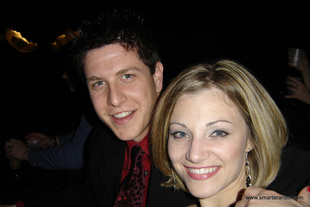 Daniel and me, 22 and 23
Daniel and me, 22 and 23 “No decision that any of us makes about our appearance makes us morally better or morally worse than any other woman…To judge a fellow woman for her choices about her own appearance is not only cruel, it also speaks to a fundamental insecurity that says, 'I am so uncomfortable with myself that I have now become deeply uncomfortable with YOU, lady — and I don't even know you.'"
This resonates with me, as I have often deemed a woman’s choices about her appearance “sad” or “ridiculous,” when what I probably meant was, “I’m anxious about aging and not sure how I will handle it.” I used to be quick to call this anxiety selfish or shallow or unimportant. I still hear well-intended women do that. But now I find their tone dismissive and oversimplified.
Physical aging is hard. Reconciling the concept of beauty is hard, especially as I’m acutely aware that my young daughters are watching me to see how to respond.
Often strangers compliment us on our “beautiful little family.” “What beautiful children,” they might tell me, or “Aren’t you pretty?” they might say to my daughters. I even say it to them. And though I appreciate the sentiment, it also makes me uneasy.
Beauty is complicated, isn’t it? It’s pushy and invasive, everywhere we turn—on billboards, the sides of trucks, all over the internet, selling everything. If this was all we had to go on, we might believe beauty is a thin, supple woman aged 16-22 with impossible curves and not a line or shadow on her face. We might start to believe that beauty is something that can be outgrown, then.
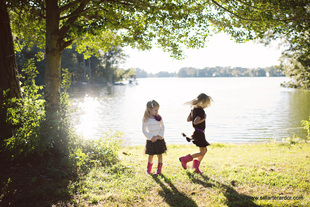 Photo credit: www.photographybybrie.com
Photo credit: www.photographybybrie.com I think part of the problem lies in the interpretation. My four-year-old feminist wanted to know why there were so few girls in the Bible (a question I will be asking the Big Man one day for sure), so we bought a book about “brave girls” of the Bible. She loves it, and mostly so do I. The story we read, about Sarah, plainly contrasted beauty and age—as if they were opposites. I cringed while reading aloud, “Isaac wasn't born when Sarah was young and beautiful, but when she was old and wrinkled.” It meant well, attempting to show that “true beauty comes from within.” But I balk at phrasing that pits time against beauty.
I’m torn. My daughters are conventionally beautiful. It’s a small part of who they are. They are also stubborn and kind, intelligent and independent and a host of other adjectives, but their beauty is the most obvious and the trait that often gets the most attention. As their mother, who used to turn heads (much to my discomfort), but doesn’t really anymore (much to my discomfort), I see the conundrum. I don’t want them to be ashamed of their appearance, whether they are seven or seventy. I want them to walk unencumbered through life’s stages with or without makeup, under or overweight, old or young. I never want them to confuse their appearance with their worth or relevance.
I guess I want them to know beauty is about the way they are cobbled together—all of them. Sure, their faces and their hips, but also their quirks and flaws, their voices and thoughts—their very souls.
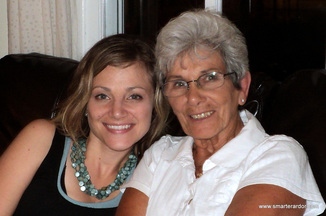 Me and my grandmother at 30 and 80
Me and my grandmother at 30 and 80 When beauty and age are separate, we would never say someone looks good “for her age.” When beauty is holistic—the way a person looks, talks, treats others, is at peace with herself—then it is attainable for everyone. When it stops being influenced by what we’re told is beautiful— by Victoria’s Secret ads, airbrushed magazine covers, women on TV— it becomes real. That’s the kind of beauty I want my girls to know and to strive for. It’s the beauty I strive for still. It’s why I can look at pictures of my 23-year-old self and smile but never for a second wish to go back. At 33, I am more at peace and surer of myself than I could have been then, wrinkles and spots and extra inches and all. I am hopeful it’s a trend I will continue as I age.
“Even though we’ve all had babies and been so many different sizes, when I think of each of you, you always look the same,” Sara Beth said the other night.
I’m so grateful for my friends. For the ones who have known me forever and the ones on that couch, who are starting to love me, with or without makeup, even if one day I choose Botox, regardless of my age or weight. We are learning together what it is to “age gracefully.” I spend more time than I’d like to admit looking quizzically into the mirror, wondering what happened and what’s to come. And as with so many other things, I am less certain as I’ve aged. Softer. More forgiving.
See? Aging can be beautiful.
 RSS Feed
RSS Feed
